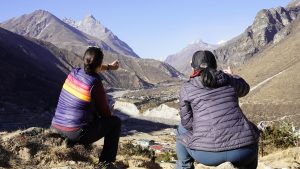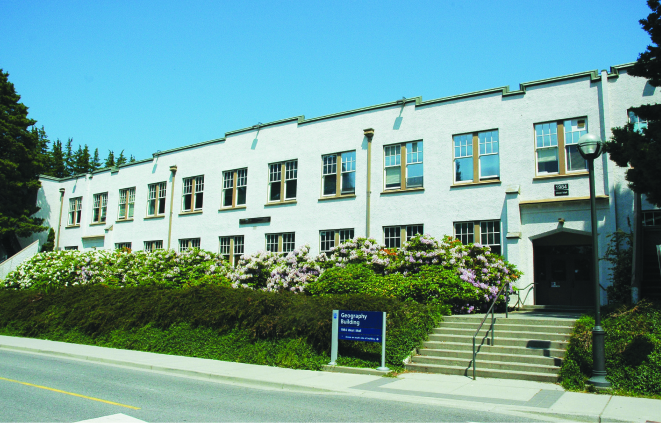

This April, Geography Professor Michele Koppes and several graduate students from the Critical Physical Geography research collective published a paper in Ecosphere titled Shedding the cloak of neutrality: A guide for reflexive practices to make the sciences more inclusive and just. Born out of a reading group formed during the pandemic, this work has come to fruition at a time when it is needed more than ever. With the backlash against diversity and inclusion broadly in Trump America, and the roll back of scientific funding for those working in crucial areas like climate change and social justice, Koppes is more passionate than ever to share her groups’ findings with the STEM community.
“We are trying to elevate these other ways of knowing and acknowledge that they are equally of value in having us understand the world. Particularly in this time of polycrisis. The climate crisis isn’t just a crisis of nature, it’s a crisis of culture, it’s a crisis of justice,” Koppes explains.
The authors argue for a diversification of research practices and perspectives in scientific inquiry in order to produce a richer understanding of the world. Acknowledgement of multilayered and subjective approaches already exist in the social sciences, but in the world of STEM disciplines, an epistemic hierarchy still dominates. More research dollars flow to the ‘hard’, abstract disciplines like math and physics than to other, ‘softer’ scientific disciplines. Western assumptions of science are that it is value neutral and objective, which isn’t a viewpoint shared around the globe. The authors make a case for how scientists can be more reflexive in their work, and share some tools that researchers can use to situate themselves in their work in ways that are ethical and empowering to the communities they are working with.
“Science is a just another lens through which understand ourselves and the world. What are limitations of what science can tell us? And what are these voices that are not being brough into the conversation?” asks Koppes.
As a geomorphologist working on the impacts of climate change on glacier retreat, Koppes knows too well how local knowledge and lived experience can be overlooked and undervalued. With field work spanning from Khumbu, Nepal to coastal BC and Alaska, Koppes sees the pitfalls of prioritizing the “eye in the sky” approach (using satellite data) versus valuing the experience on the ground of local communities. Climate change impacts on glacier melt rates and resulting flooding not only affect downstream communities and infrastructure but also rising lake levels and increasing mass movements that are drowning traditional lands and migration routes, and a myriad of other effects local communities witness. Additionally, the cultural and spiritual relationships between people and the land often isn’t taken into consideration in any assessment of these impacts.


This article offers environmental scientists several tools to begin to decolonize and break open the mindset of rigid scientific approaches. One tool is the acknowledgement of one’s thought styles through the use of positionality statements, which help make transparent what shapes one’s work. Such statements help to contextualize how someone arrived at their research questions and methods and how this might impact their work and results. Furthermore, using more personal and active voices in scientific communication, and acknowledging what passions and lived experience led you to where you are when giving a research talk can help to contextualize potential biases.
“The active voice is always shunned in scientific papers. We say ‘the data said this…’ not ‘I collected this data and I found…’. This removes context and assumes purity and objectivity of methods and analysis that are not true. We need to shift things to take a more holistic approach,” says Koppes.
Dr. Koppes’ own work blends research methods using traditional data collection, storytelling, sound exploration and community engaged practices to help inform how we understand landscapes. Koppes describes her approach as “a braiding together” of western science, Indigenous ways of knowing, storytelling, lived experience, cultural and spiritual perspectives to form a more subjective picture of the world we inhabit and shape. This blended approach leads to fruitful collaborations with non-scientists and local communities, and she hopes is one that will inspire other geoscientists to expand their practices.
The authors of this paper hope that engaging in these kinds of reflexive work will “broaden the tent” of science – showing others there is space in the field for them and their perspectives, and that diversity of thought is valued. The more context that researchers provide when sharing their research agendas and findings, the more audiences may feel a sense of shared humanity and commonality. This will only strengthen the field and the practice science as a whole.
Quick links:
- Learn more about Michele Koppes’ research and the work happening in her Landscapes of Climate Change Lab
- Read the publication Shedding the cloak of neutrality: A guide for reflexive practices to make the sciences more inclusive and just


